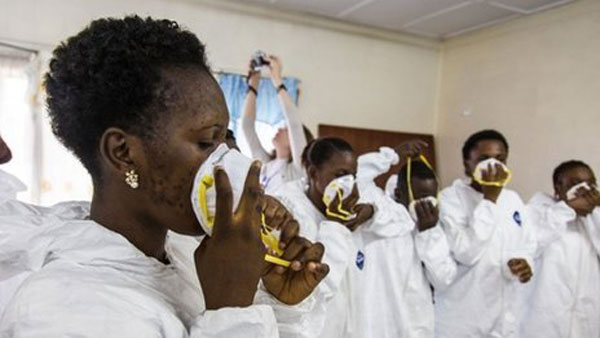New figures suggest 70% of those infected with Ebola in West Africa have died, higher than previously reported, says the World Health Organization.

Ebola infections will treble to 20,000 by November if efforts to tackle the outbreak are not stepped up, the UN agency has warned.
In the worst case scenario, cases in two nations could reach 1.4 million in January, according to a
Experts said the
The world's largest outbreak of Ebola has caused 2,800 deaths so far, mainly in
Outbreaks in
In other developments:
• More than 160 NHS staff have volunteered for
• Chief medical officer for
• The
• British military and humanitarian staff have arrived in
Scientists have warned that swift action is needed to curb the exponential climb in the Ebola outbreak.
Two new estimates suggest that cases of Ebola could soar dramatically in the three countries with the majority of cases.
Projections published in The New England Journal of Medicine predict that by early November there will have been nearly 20,000 cases.
The analysis of confirmed cases also suggests death rates are higher than previously reported at about 70% of all cases, rather than 50%.
Dr Christopher Dye, Director of Strategy for WHO, said unless control measures improved quickly "these three countries will soon be reporting thousands of cases and deaths each week, projections that are similar to those of the Centers for Disease Control and Prevention (CDC)".
The CDC said that there could be up to 21,000 reported and unreported cases in
In predictions released on Tuesday, the
But experts cautioned that the numbers seemed "somewhat pessimistic'' and did not account for infection control efforts already under way.
Drug trials
Meanwhile, The Wellcome Trust charity has announced that experimental drugs will be tested in
Dr Peter Horby, of the Centre for Tropical Medicine and Global Health at the
"We want to evaluate these carefully, properly, in affected countries in
"For the next one or two weeks we'll be doing site assessments and we'll be working with the WHO on identifying which drugs to prioritise, and then there'll be a number of steps in setting up the systems - getting ethical approval through the countries and getting community participation and agreement to run the trials."
BBC


























